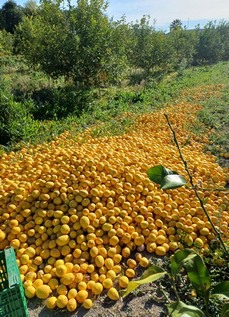The Fino lemon campaign is coming to a close in Alicante, with an impact that, once again, has hit producers the hardest. According to the prices reported by the Valencian Government, since the beginning of the year, the average price at origin per kilo of Fino lemons has remained below 20 cents. In week 14, it dropped as low as 8 cents per kilo. Meanwhile, in 2024, the average price after handling has so far exceeded the average of the last five campaigns every week except one. At this time, it stands 3.3% above the average, at close to 83 cents per kilo.

"For producers, it's an absolute ruin," says José Vicente Andreu, a lemon producer from Alicante. "With costs that, depending on the farm, its size and mechanization, range between 30 and 35 cents per kilo, we might be able to hold on for a year, but not much longer."
"The campaign has been marked by a large production and by the weather conditions. The lack of rainfall and the damage caused by the five exceptional hailstorms that hit the south of Alicante, damaging 32% of the insured plots, have significantly affected the results," he says. "However, we had a good start, with a strong demand for Spanish lemons, as Argentina and South Africa withdrew prematurely due to phytosanitary problems and quality issues, and Spain started a month earlier."
"Things went well until mid-November, but since then, there has been an excess supply and a reduction in consumption, which has caused exports to fall, despite us having a higher quality harvest. Compared to the 2021/22 campaign, which was similar to this year's, we have lost export share, and consumption is also down."
 "Due to the successive crises in Europe, inflation and the loss of consumers' purchasing power, lemons are still perceived as an expensive product, despite us having to deal with terrible prices at origin," says the producer. Checking the website of one of Germany's main supermarkets, you can see organic lemons are sold for 99 cents each, and conventional ones for 89 cents.
"Due to the successive crises in Europe, inflation and the loss of consumers' purchasing power, lemons are still perceived as an expensive product, despite us having to deal with terrible prices at origin," says the producer. Checking the website of one of Germany's main supermarkets, you can see organic lemons are sold for 99 cents each, and conventional ones for 89 cents.
The lemon processing industry is a long-standing customer for the sector, but this year, "given the record harvest, less will be processed," he says. "The figures are not comparable with those of the 2022/23 campaign, when the production notably fell, but with those of 2021/22, when we had a similar harvest to this year's. The volume for processing is estimated to be 15% lower than two campaigns ago. Apparently, the drop in the consumption of the soft drink industry could be one of the causes of the decline in the demand for citric acid and lemon concentrates."
In this regard, José Vicente says that the citrus industry has carried out unfair practices expressly prohibited by the Food Chain Law, which establishes that "each operator must pay a price equal to or higher than the actual cost of production to the immediately preceding link in the chain."
"The sector, with an average age of almost 65 years, is undercapitalized"
Spanish agricultural organizations have estimated that between 300,000 and 400,000 tons of lemons could be left unharvested in Alicante and Murcia, causing multimillion losses
"The average age of agricultural producers in the Region of Valencia comes close to 65 years. This means that there are few young people, and that many growers are still working despite being officially retired, which means they are using their pension money to continue cultivating their plots."
"The situation is extreme and we need the Administration to tackle this severe problem head-on. The sector has been left undercapitalized. There are clear signs of abandonment in all plots, and I'd say we have a buffer for one more campaign, at most."

"At the same time, in the entire Region of Valencia, land is quietly and unstoppably falling into the hands of large investment funds. The community of irrigators of Orihuela, of which I am secretary, had 192 irrigators in 2006, and today, on the same surface, only has 130. This year, interested parties are already taking advantage of the crisis in the lemon sector to make new purchase operations."
For more information:
José Vicente
Tel.: 619 31 74 15
email: [email protected]
